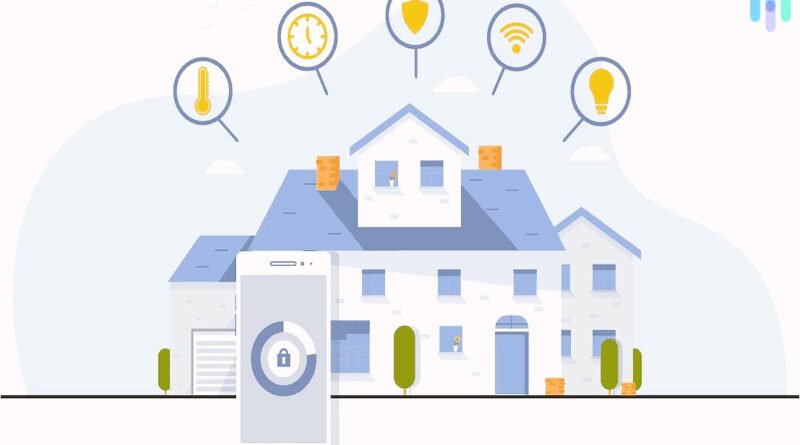Smart Home Technology Benefits: Making Life Easier and Smarter
Introduction
Smart home technology is reshaping the way we live. From voice-activated assistants to automated security systems, these innovations bring convenience, efficiency, and enhanced security into our daily routines. But what are the true smart home technology benefits, and how can they improve modern living? Let’s break it down.
1. Convenience at Your Fingertips
Effortless Control Over Your Home
One of the biggest smart home technology benefits is convenience. Imagine adjusting the thermostat, dimming the lights, or locking your doors without leaving your couch. With smart devices, these actions are just a voice command or a tap away on your smartphone.
Automation for a Seamless Experience
Smart homes take automation to the next level. Motion sensors can turn on lights when you enter a room, and programmed schedules can ensure your coffee starts brewing before you even wake up. These little conveniences add up, making daily tasks effortless.
2. Enhanced Home Security
Smart Locks and Surveillance
Security is a top priority for homeowners, and smart technology has made it more reliable than ever. Smart locks provide keyless entry and allow you to grant access remotely. Video doorbells and security cameras let you monitor your home from anywhere, providing peace of mind.
Automated Alerts and Monitoring
If suspicious activity is detected, smart security systems send real-time alerts to your phone. Some devices can even integrate with law enforcement services for faster response times.
3. Energy Efficiency and Cost Savings
Smart Thermostats and Lighting
A key smart home technology benefit is its ability to reduce energy consumption. Smart thermostats learn your habits and adjust the temperature accordingly, cutting down on unnecessary energy use. Similarly, smart lights can turn off when no one is in the room, helping to lower electricity bills.
Efficient Water and Power Usage
Smart irrigation systems optimize watering schedules based on weather conditions, preventing waste. Smart plugs can also help reduce power consumption by cutting electricity to unused appliances.
4. Improved Health and Well-being
Smart Air Purifiers and Climate Control
Maintaining a healthy living environment is easier with smart air purifiers that detect and filter out pollutants. Smart humidifiers and dehumidifiers adjust moisture levels to keep your home comfortable.
Wearables and Home Health Monitoring
Some smart homes integrate with health-focused devices, such as smart scales and blood pressure monitors, making it easier to track fitness goals and overall wellness.
5. Seamless Entertainment Experience
Voice-Controlled Entertainment Systems
Another smart home technology benefit is the ability to streamline entertainment. Voice assistants can control TVs, speakers, and streaming services, creating an immersive experience without searching for remotes.
Multi-Room Audio and Smart Displays
Smart speakers allow you to play music throughout your home, while smart displays can show news, weather updates, and even video calls, making them a great addition to modern living spaces.
6. Increased Home Value and Future-Proofing
Smart Homes Attract Buyers
Homes equipped with smart technology are more attractive to buyers, increasing resale value. Features like automated lighting, security systems, and energy-efficient appliances can make a property stand out in the real estate market.
Preparing for Future Innovations
As technology evolves, smart home systems are becoming more adaptable. Investing in these features now ensures your home stays compatible with future advancements.
7. Personalized Living Experience
Customizable Home Settings
Smart home devices allow personalization, from setting different lighting moods to adjusting the thermostat based on personal preferences. With AI-driven automation, homes can anticipate needs and adapt accordingly.
Voice Assistants for Everyday Tasks
Devices like Alexa, Google Assistant, and Siri act as personal assistants, setting reminders, controlling smart gadgets, and even managing grocery lists.
8. Smart Home Technology in Home Offices
Optimized Workspaces
Remote work is more efficient with smart home technology. Adjustable smart lighting reduces eye strain, while noise-canceling smart speakers help create a distraction-free environment.
Energy Management for Productivity
Smart power strips and thermostats can optimize energy use during work hours, ensuring comfort and reducing unnecessary energy waste.
9. The Future of Smart Home Technology
AI and Machine Learning Integration
Smart home technology is evolving with AI, making homes even more intuitive. Future developments may include self-learning appliances that adapt to individual behaviors and preferences.
Expanding Connectivity with IoT
As the Internet of Things (IoT) grows, more devices will seamlessly connect, enhancing automation and efficiency in smart homes.
Conclusion
The smart home technology benefits are transforming modern living, offering convenience, security, energy efficiency, and a personalized experience. As technology advances, smart homes will continue to improve, making everyday life easier and more efficient.
Also visit Digital Global Times for more quality informative content.

